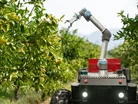Agribots: The possible future development of food harvesting

Israeli start-up, Tevel, is just one example of a company that has designed robots to partake in fruit picking. Its flying autonomous robots act like drones and, powered by AI and computer algorithms, can pick fruit and aim to optimise the harvesting process.
Apple-picking drones are nothing new, with AI and automated tools continually helping to make food harvesting and production more efficient. However, more companies are increasingly weighing up benefits to agriculture robots (agribots) and if a surge in automation can help provide harvesting solutions.
It is also important to consider if this type of technology ultimately works to replace human labour in the future.
Will bots help to revolutionise food supply chains?
These types of robots are agile and can operate around the clock, providing cost-efficient solutions for farmers. With this in mind, Tevel’s software allows for real-time monitoring of the orchard’s harvesting status.
The data collected provides farmers with unique insights into specific characteristics and contents of each bin prior to its delivery to the packing house. It enables growers to eliminate uncertainties regarding market value, quality, and output, as well as improving efficiencies on site.
Farmers can also easily access information such as the quantity of fruit harvested, its weight, colour grading, ripeness, diameter, timestamp, geolocation of each fruit and other vital data.
With Agribots, sensors and 3D cameras can detect which fruit is ripe, as well as measuring sugar content and checking for diseases. The bots have a completely autonomous system, which includes decision-making, with some using electrostatic charges that mimic the movements of a bee to help with pollination.
Honeybees have also contributed significantly to AI research as their brains could help manufacture robots and autonomous vehicles to make decisions in a similar way. It also confirms the importance of bees to the food industry and how pollination significantly contributes to food supply chains.
It is interesting to consider how these essential aspects of food sourcing and production could be mimicked by robots and AI tools. However, more research and practice is definitely required before these answers will become clear.
Manual labour remains indispensable alongside AI
AI is already contributing to the food sector, with Siemens in particular helping the indoor farming industry expand its business to meet global food supply demands, with AI/ML being called upon to keep plants healthy.
There are 500 agritech companies listed in Israel alone, contributing significantly to global food innovation. Tevel technology in particular is used on farms in the US, Italy and Israel.
Technology companies have designed fruit-picking drones and tree-pollinating 'paddles' to make farms more efficient at a time of worker shortages and climate change. In Chile for example, flying robots use AI/ML to detect ripe apples before pulling the fruit from the tree.
However, these types of solutions are currently not perfected. It is still difficult for robots to manoeuvre around tree branches for example, which may impact the amount of fruit or crop picked. In addition, it is difficult for the robots to know if a fruit is infested with worms.
These types of issues need addressing if farms want to continue using agribots frequently. Yet, it appears as though at the moment that manual labour and the human workforce is still irreplaceable within the food industry.
******
For more insights into the world of food be sure to follow us on LinkedIn & Twitter.
You may also be interested in Construction Digital, or Mining Digital.
Please also check out our upcoming event - Sustainability LIVE in London on September 6-7 2023.
******
BizClik is a global provider of B2B digital media platforms that cover Executive Communities for CEOs, CFOs, CMOs, Sustainability Leaders, Procurement & Supply Chain Leaders, Technology & AI Leaders, Cyber Leaders, FinTech & InsurTech Leaders as well as covering industries such as Manufacturing, Mining, Energy, EV, Construction, Healthcare + Food & Drink.
BizClik – based in London, Dubai, and New York – offers services such as Content Creation, Advertising & Sponsorship Solutions, Webinars & Events
Featured Articles
Fresh investment supports TRACT in enhancing tools for sustainability in the food and agricultural sectors, aligning with EU regulations
The devastating floods in Spain have shaken up the global citrus supply, heightening challenges in the fruit juice drinks market
McDonald's has spent 40 years supporting students with scholarships & plans to continue, despite Robert F. Kennedy Jr.’s plan to Make America Healthy Again




